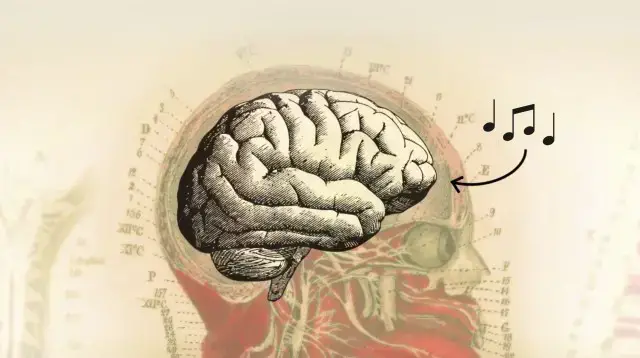What do aliens, apes, and orchestras all have in common? Professor Michael Spitzer explains how they each help us understand the origins of music.
Show More Show Less View Video Transcript
0:00
Is music inherently human
0:03
Not necessarily. Animals have music. And once you widen the lens as widely as possible
0:10
and see the big picture where sapien music comes from, the cosmic joke, the irony, is that humans aren't very musical at all
0:21
And we know this because we evolved along the ape line and apes, compared to birds, are not musical
0:28
How can I say that? Birds have vocal learning. They can creatively learn new songs
0:33
Apes can't do that. They are confined to the cause they're born with
0:37
Insects can pulse together in rhythm, and apes don't have that. So it's very odd that humans evolved from apes who are not musical
0:48
but humans evolved music again from the ground up from scratch. I'm Michael Spitzer. I'm Professor of Music at the University of Liverpool in the UK
0:58
I'm listening to a book called The Musical Human, A History of Life on Earth
1:14
Voyager 2. Like Voyager 1 before it, it is a marvel of technology
1:21
a remarkable instrument of humanity's search for celestial knowledge. So when NASA sent the Golden Record aboard Voyager 40 years ago
1:34
this suggested a very interesting thought experiment because NASA stocked the record with diverse examples of human music
1:43
For instance, a Bach-Vandenberg concerto, Chuck Berry's Johnny B. Goode, Pan Pipes from the Solomon Islands
1:53
Court music, Gamelan from Java. If we imagine aliens opened this in a billion years
2:04
will they be able to extrapolate some common denominator something fundamentally human and this assortment of Earth music This begs the question what do they have in common Now I think what they do have in common even for an alien
2:20
is that sapiens are flatlanders. We inhabit a very narrow band of perceptual space
2:30
We can't hear as low as whales. We can't hear as high as bats
2:35
Our songs aren't as long as whale songs, which can be 23 hours long
2:39
They aren't as fast as a pipistrelle bat song, which can be as short as a wingbeat
2:44
What they will see, though, is a lot of commonality between sapiens music and animal music
2:51
Both are hierarchical. It has to say that we repeat at rising levels
2:57
Music is the art of repetition. You have notes in a bar. You have bars repeated in a phrase
3:04
You have phrases in a section, section in the work, and so on ad infinitum
3:09
And that might strike aliens as interesting, and they might say, well, actually, this is not so different from animal music
3:15
But they will recognise sapiens for perhaps having this walking meter, which goes back to Australopithecines 4 million years ago
3:29
When we talk about the origin of human music, It's really about assembling elements of music which were synthesised much further down the road
3:40
And one of these elements was bipedalism, that what marks the first hominins apart from apes and our common ancestor was getting up on our feet
3:51
There is this link between rhythm and motion, which is due to the connections in the human brain between the motor regions controlling our motion
4:01
and the regions controlling hearing. For example, I once attended a concert with my infant toddler
4:08
and there were a thousand toddlers all jumping up and down instinctively to orchestra
4:14
playing the Lone Ranger. Now they had never heard the Lone Ranger before
4:18
but they had an instinctive response to that rhythm So walking is the first step of a whole cascade of evolutionary adaptations
4:34
Our cranial volume triples in size, we become a lot smarter. And with our increased brain size comes the capacity to control our fingers, to make links
4:45
with the motor domains of our brain. We become more dexterous and ultimately more capable of crafting flutes and playing them
4:53
But standing up also gives us more space to breathe. And our larynx descends through our vocal tract
5:00
Our hyode bone, which supports our tongue, evolves so we can articulate what we sing
5:07
And as our vocal tract learned how to produce an infinitely greater variety of sounds
5:15
Our capacity to make sounds exceeded their function. If you compare us with, say, the vervet monkey
5:23
they can make four kinds of calls, and each call warns other monkeys of a particular kind of danger
5:30
But when you can produce a thousand kinds of sounds, there's an excess of sounds
5:35
and this is where music starts to become a possibility, where you're playing with sound
5:40
you're enjoying sound for sound's sake, no longer having a function. And at this point, I think human music steps away from animal vocalization or animal calls
5:56
What also makes human music so distinctive is the very human drives of emotions
6:04
and indeed the finite quality of human life. Sadness, happiness, anger, fear, and so on
6:12
We have mirror neurons in our brains. If you're sad, I instinctively cleave to your sadness
6:22
I mirror it. I emote with you. And that's the same with music
6:29
When I hear a sad song my body my mirror neurons are instinctively sympathizing are mirroring the human sadness encoded in that sad song
6:43
And music is full of similar responses. Music is made of patterns and patterns can either be
6:51
allowed to run across or they can be frustrated through shocks. And when we hear a shock in music
6:56
It can be a bang or the interruption of a pattern. That engages the same faculties in our brain as danger out in the field
7:07
Of course nobody dies in music, this is only a derived effect of that
7:14
This is why we think that music is able to express emotion in a very visceral way
7:19
Music is a fantastic way of expressing your deepest emotions and your identity, which can't be captured by language
7:30
Why is that? Because music is far too precise for words to capture what's going on
7:37
And there's a reason why teenagers imprint their taste in music with songs they learn at that time
7:44
because music has always come to define identity of who you are. So the question of is music a universal language is an interesting one
7:54
because on the surface, music is absolutely universal. What humans brought to the table is that we're the great synthesizers
8:02
We put together the rhythms of insects, the melody of birds, the gestural sociality of apes
8:09
I think it's a reason why, although human music is innate and universal
8:15
it's also learned. And there's also a reason why humans have always been haunted by nostalgia for birdsongs
8:26
We hear birds in the trees, and this gives us a sense of inadequacy
8:30
because birdsong is natural and human music is not. Want to dive deeper
8:44
Become a Big Think member and join our members-only community, watch videos early and unlock full interviews
#Music & Audio
#Experimental & Industrial Music
#Music Education & Instruction
#Music Reference
#Religious Music
#World Music
#Other



